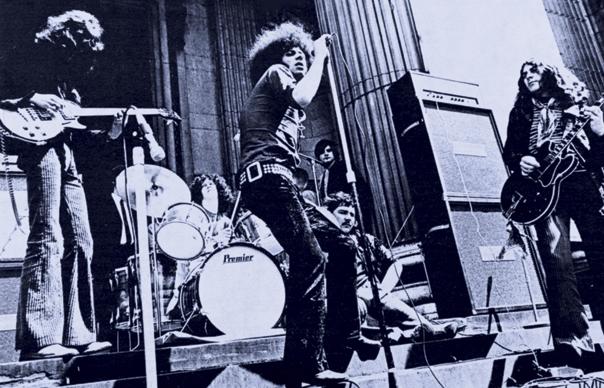Hairy misfits defiant debut... There's a delicious irony to the fact that Britain's first punk album was released at the height of '67's 'summer of love' by a bunch of long haired, dope-smoking hippies. The Deviants came from the same psychedelic counter-culture of Ladbroke Grove pads and squats that produced Hawkwind, Quintessence and the Pink Fairies. Yet aside from their choice of drugs, everything about singer Mick Farren and his misfits was pure punk: the garage riffs (mainly borrowed from Bo Diddley via the Pretty Things), the 'fuck you' attitude, the DIY aesthetic of both recording and packaging (which folded out into a poster), the anti-social sneer and song titles such as ''Garbage'' and ''Nothing Man''. As Farren succinctly puts it today, "We grew our hair but we kept our leather jackets.'' If they'd had the luxury of a proper budget, the Deviants might've made the British We're Only In It For The Money, for there are touches of cynical, Zappa-esque wit on ''Deviation Street''. The mayhem of the Fugs, Stooges and MC5 made them obvious fellow-travellers, too. But British rock at the time had produced nothing quite like the Deviants. There are concessions to '60s psychedelia on The Barrett/Ayers-style whimsy of ''Child Of The Sky'' and in guitarist Sid Bishop's clumsy Hendrix impersonations. But for the rest, Farren's antagonistic bellowing breathes a fiery contempt for the notion that singing ''All You Need Is Love'' will usher in the Aquarian Age. The Deviants made two more albums before the decade was out. Disposable ('68) boasted such admirable moments of insurrection as ''Let's Loot The Supermarket''. But by Deviants 3 ('69) they were beginning to sound like just another heavy rock band. ''We learned a few things and started trying to write songs and that fucked us up,'' Farren admits. In true punk spirit, the Deviants really had one rowdy, messy shot. They splurged it up the wall on Ptooff! and we'd have to wait another decade to hear anything as defiantly ugly, truculent and resentful in British rock music again. NIGEL WILLIAMSON Photo credit: Phil Smee
Hairy misfits defiant debut…
There’s a delicious irony to the fact that Britain’s first punk album was released at the height of ’67’s ‘summer of love’ by a bunch of long haired, dope-smoking hippies. The Deviants came from the same psychedelic counter-culture of Ladbroke Grove pads and squats that produced Hawkwind, Quintessence and the Pink Fairies. Yet aside from their choice of drugs, everything about singer Mick Farren and his misfits was pure punk: the garage riffs (mainly borrowed from Bo Diddley via the Pretty Things), the ‘fuck you’ attitude, the DIY aesthetic of both recording and packaging (which folded out into a poster), the anti-social sneer and song titles such as ”Garbage” and ”Nothing Man”. As Farren succinctly puts it today, “We grew our hair but we kept our leather jackets.”
If they’d had the luxury of a proper budget, the Deviants might’ve made the British We’re Only In It For The Money, for there are touches of cynical, Zappa-esque wit on ”Deviation Street”. The mayhem of the Fugs, Stooges and MC5 made them obvious fellow-travellers, too. But British rock at the time had produced nothing quite like the Deviants. There are concessions to ’60s psychedelia on The Barrett/Ayers-style whimsy of ”Child Of The Sky” and in guitarist Sid Bishop’s clumsy Hendrix impersonations. But for the rest, Farren’s antagonistic bellowing breathes a fiery contempt for the notion that singing ”All You Need Is Love” will usher in the Aquarian Age.
The Deviants made two more albums before the decade was out. Disposable (’68) boasted such admirable moments of insurrection as ”Let’s Loot The Supermarket”. But by Deviants 3 (’69) they were beginning to sound like just another heavy rock band. ”We learned a few things and started trying to write songs and that fucked us up,” Farren admits. In true punk spirit, the Deviants really had one rowdy, messy shot. They splurged it up the wall on Ptooff! and we’d have to wait another decade to hear anything as defiantly ugly, truculent and resentful in British rock music again.
NIGEL WILLIAMSON
Photo credit: Phil Smee



